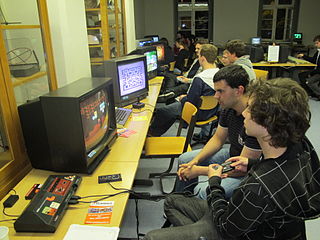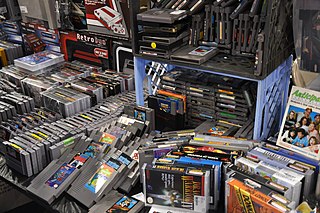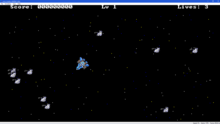
Nintendo Co., Ltd. is a Japanese multinational video game company headquartered in Kyoto. It develops, publishes and releases both video games and video game consoles.
VisualBoyAdvance is a free emulator of the Game Boy, Game Boy Color, and Game Boy Advance handheld game consoles as well as of Super Game Boy and Super Game Boy 2.

Project64 is a free and open-source Nintendo 64 emulator written in the programming languages C and C++ for Microsoft Windows. This software uses a plug-in system allowing third-party groups to use their own plug-ins to implement specific components. Project64 can play Nintendo 64 games on a computer reading ROM images, either dumped from the read-only memory of a Nintendo 64 ROM cartridge or created directly on the computer as homebrew.
Kotaku is a video game website and blog that was originally launched in 2004 as part of the Gawker Media network. Notable former contributors to the site include Luke Smith, Cecilia D'Anastasio, Tim Rogers, and Jason Schreier.

Retrogaming, also known as classic gaming and old school gaming, is the playing and collection of obsolete personal computers, consoles, and video games. Usually, retrogaming is based upon systems that are outmoded or discontinued, although ported retrogaming allows games to be played on modern hardware via ports or compilations. It is typically for nostalgia, preservation, or authenticity. A new game could be retro styled, such as an RPG with turn-based combat and pixel art in isometric camera perspective.

Dolphin is a free and open-source video game console emulator for GameCube and Wii that runs on Windows, Linux, macOS, Android, Xbox One, Xbox Series X and Series S.

Higan is a free and open source emulator for multiple video game consoles, including the Super Nintendo Entertainment System. It was developed by Near. Originally called bsnes, the emulator is notable for attempting to emulate the original hardware as accurately as possible through low-level, cycle-accurate emulation and for the associated historical preservation efforts of the Super NES platform.

Garry's Mod is a 2006 sandbox game developed by Facepunch Studios and published by Valve. The base game mode of Garry's Mod has no set objectives and provides the player with a world in which to freely manipulate objects. Other game modes, notably Trouble in Terrorist Town and Prop Hunt, are created by other developers as mods and are installed separately, by means such as the Steam Workshop. Garry's Mod was created by Garry Newman as a mod for Valve's Source game engine and released in December 2004, before being expanded into a standalone release that was published by Valve in November 2006. Ports of the original Windows version for Mac OS X and Linux followed in September 2010 and June 2013, respectively. As of September 2021, Garry's Mod has sold more than 20 million copies. A successor, Sandbox, has been in development since 2015.

A video game console emulator is a type of emulator that allows a computing device to emulate a video game console's hardware and play its games on the emulating platform. More often than not, emulators carry additional features that surpass limitations of the original hardware, such as broader controller compatibility, timescale control, easier access to memory modifications, and unlocking of gameplay features. Emulators are also a useful tool in the development process of homebrew demos and the creation of new games for older, discontinued, or rare consoles.

RetroArch is a free and open-source, cross-platform frontend for emulators, game engines, video games, media players and other applications. It is the reference implementation of the libretro API, designed to be fast, lightweight, portable and without dependencies. It is licensed under the GNU GPLv3.

RPCS3 is a free and open-source video game console emulator and debugger for the Sony PlayStation 3 that runs on Windows, Linux, FreeBSD and macOS operating systems, allowing PlayStation 3 games and software to be played and debugged on a personal computer. It is being developed in the C++ programming language targeting x86-64 CPUs and features OpenGL and Vulkan as its backend renderers.

Denuvo Anti-Tamper is an anti-tamper and digital rights management (DRM) system developed by the Austrian company Denuvo Software Solutions GmbH. The company was formed from a management buyout of DigitalWorks, the developer of SecuROM, and began developing the software in 2014. It was introduced with FIFA 15 in September. In addition to Denuvo Anti-Tamper, Denuvo Software Solutions has developed the anti-cheat system Denuvo Anti-Cheat and Nintendo Switch Emulator Protection, which attempts to prevent Nintendo Switch games from being emulated. The company was acquired by Irdeto in January 2018.

Cemu is a free and open-source Wii U emulator, first released on October 13, 2015 for Microsoft Windows as a closed-source emulator developed by Exzap and Petergov. Experimental builds currently support Linux and macOS, in addition to the Windows environment available from launch. Though still under development, it is able to run the majority of games smoothly, assuming compatible hardware. The popularity of the emulator spiked with the release of The Legend of Zelda: Breath of the Wild in 2017 as Cemu successfully booted and ran the title within hours of its release.

Citra is a discontinued free and open-source emulator of the handheld Nintendo 3DS for Windows, macOS, Linux, and Android. Citra's name is derived from CTR, which is the model name of the original 3DS. Citra can run many homebrew games and commercial games.

Video game preservation is a form of preservation applied to the video game industry that includes, but is not limited to, digital preservation. Such preservation efforts include archiving development source code and art assets, digital copies of video games, emulation of video game hardware, maintenance and preservation of specialized video game hardware such as arcade games and video game consoles, and digitization of print video game magazines and books prior to the Digital Revolution.
The Nintendo data leak, also known as the Nintendo Gigaleak, is a series of leaks of data from the Japanese video game company Nintendo on the anonymous imageboard website 4chan. The leak started in March 2018, but became most prominent in 2020. Ten main sets of data leaked on 4chan, ranging from game and console source code to internal documentation and development tools. The name "Gigaleak" mainly refers to the second leak on July 24, 2020, which was 3 gigabytes in size. The leaks are believed to have come from companies contracted by Nintendo in the design of these consoles, and/or from individuals previously convicted of intrusion into Nintendo systems. An earlier, much smaller leak had also occurred in 2018 which contained the Nintendo Space World 1997 demos for Pokémon Gold and Silver.

The Steam Deck is a handheld gaming computer developed by Valve and released on February 25, 2022. The device uses Valve's Linux distribution SteamOS, which incorporates the namesake Steam storefront. SteamOS uses Valve's Proton compatibility layer, allowing users to run Windows applications and games. In addition to handheld use, the Steam Deck can be connected to a TV or monitor through a docking station and be used like a desktop computer or home video game console. In desktop mode, users can install third-party applications for Linux.
Emulators of the Nintendo Switch, Nintendo's current eighth-generation video game console, have been in development since 2017, less than a year after the console's release. Multiple emulators have been in development, the most well-known being the now-defunct Yuzu, and Ryujinx. Switch emulators have been widely noted by video games journalists for the swift and significant progress of their abilities to accurately emulate the console, as they are already able to run existing and new titles for the console in a playable state, sometimes within days of their release, as well as able to run on a variety of devices, including PCs running Microsoft Windows and Linux, and the Steam Deck.















